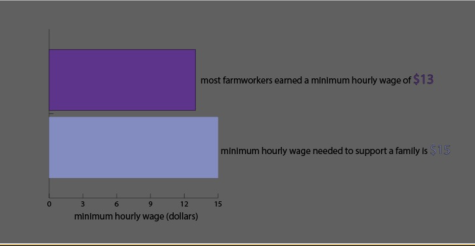Socioeconomic perspective on Hispanic life in California
June 2, 2022
Additionally, the lack of protection for employed manual laborers disproportionately affects Hispanic and Latinx Americans. Fifty-one percent of hired farmworkers are Hispanic, and migrant workers constitute 5% of this group.
Rachelle Escamilla, a Chicanx poet residing in Monterey and former Library of Congress (LOC) Scholar, worked as a picker in the apricot orchards during her summers as a child. Her older family members’ livelihood centered around manual labor jobs, and she spent her tenure as a Scholar transcribing a testimony her grandfather gave in favor of migrant rights.
“My grandfather was a campesino [a farmer] who had three children die of malnutrition because the farmworkers at the time would pick the food for everyone else but didn’t have enough money to actually put food on their own tables,” Escamilla said. “Every piece of vegetable that is eaten by anyone in California is picked by a Latinx person, and that, to me, is most important, because migrant workers still don’t have the same rights and access that they should have.”


In California, the minimum hourly wage for farm workers ranges from $13 to $14, which is less than the $15 hourly wage that would best support the higher cost of living in-state. Especially during the pandemic, many workers found themselves without the safety net of long-term employment, access to medical care and PPE, or housing.
The term “Hispanic” refers to people with origins in Spain while the more expansive term Latinx that arose in the last 20 years encompasses those who do not have roots in Spain or do not speak Spanish, and Chicanx is used for people with Mexican heritage. Though Hispanic Heritage Month is intended as a time for celebration, naming it so exclusively raises eyebrows as to who, exactly, is celebrated.
“I think probably one of the things that has always been very perplexing is the term Hispanic,” Aguero-Esparza said. “Growing up as a Latinx here in California, the term Hispanic was not one that was utilized. I think it is more about trying to be broader in terms of who fits into that — who gave us that term? Do we call ourselves that or not?”
For Eileen Hernandez-Cuellar, a poet based in Los Angeles who identifies as Mexican-American and Chicana, umbrella terms such as Hispanic raise similar questions about identity and representation. To her, Hispanic Heritage Month, which occurs in the fall and aims to celebrate Latinx culture and contributions, has a flawed name but remains a vital opportunity to appreciate the resilience of her community.
“The word ‘Hispanic’ is European, it’s a Eurocentric word,” said Hernandez-Cuellar. “I really don’t acknowledge when people call it Hispanic Heritage Month because it seems a little ignorant to me. It doesn’t feel special, it doesn’t feel inclusive. [Still] let’s have a parade for Latinx Heritage Month, let’s take into account how important it is to recognize the month and just be proud of who we are.”